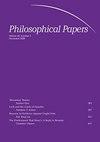The Essential Tension in Phenomenal Consciousness
IF 1.3
3区 哲学
0 PHILOSOPHY
引用次数: 1
Abstract
Abstract The contemporary standard view of phenomenal consciousness (PC)—shared by reductionists and non-reductionists alike—takes it to be a simple, ‘low-level’, ‘pre-reflective’ feature of mental states, yet at the same time attributes to it both a qualitative and a subjective character (or a phenomenal content and an aspect of subjective awareness). I argue that these two allegedly constitutive elements of PC do not go together as harmoniously as is usually assumed. The standard view introduces a complexity into the notion of PC which gives rise to problems of the sort traditionally associated with higher-order views (i.e., regress and redundancy problems). Finding the tension more or less inescapable, and rejecting a simplistic view like Dainton’s, which dispenses altogether with subjective awareness—and arguing that there is a special problem with accounting for the particularity of conscious states—I explore some speculative suggestions as to how subjective awareness could be understood as a distinctive factor that cannot be assimilated to phenomenal content, while maintaining that the two elements are intimately related.现象意识的本质张力
摘要现象意识(PC)的当代标准观点——还原论者和非还原论者都有同感——认为它是一种简单的、“低级”的、“预反射”的精神状态特征,但同时又将其归因于定性和主观特征(或现象内容和主观意识的一个方面)。我认为,PC的这两个据称构成要素并不像通常认为的那样和谐地结合在一起。标准视图为PC的概念引入了复杂性,这导致了传统上与高阶视图相关的问题(即回归和冗余问题)。发现这种紧张或多或少是不可避免的,并拒绝像丹顿那样的简单化观点,它完全免除了主观意识——并认为解释意识状态的特殊性有一个特殊的问题——我探讨了一些推测性的建议,即如何将主观意识理解为一个无法被现象内容同化的独特因素,同时坚持这两个元素是密切相关的。
本文章由计算机程序翻译,如有差异,请以英文原文为准。
求助全文
约1分钟内获得全文
求助全文
来源期刊

Philosophical Papers
PHILOSOPHY-
CiteScore
2.10
自引率
0.00%
发文量
18
期刊介绍:
Philosophical Papers is an international, generalist journal of philosophy edited in South Africa Original Articles: Articles appearing in regular issues are original, high-quality, and stand-alone, and are written for the general professional philosopher. Submissions are welcome in any area of philosophy and undergo a process of peer review based on initial editor screening and refereeing by (usually) two referees. Special Issues: Topic-based special issues are comprised of both invited and submitted papers selected by guest editors. Recent special issues have included ''Philosophy''s Therapeutic Potential'' (2014, editor Dylan Futter); ''Aging and the Elderly'' (2012, editors Tom Martin and Samantha Vice); ''The Problem of the Criterion'' (2011, editor Mark Nelson); ''Retributive Emotions'' (2010, editor Lucy Allais); ‘Rape and its Meaning/s’ (2009, editor Louise du Toit). Calls for papers for upcoming special issues can be found here. Ideas for future special issues are welcome.
 求助内容:
求助内容: 应助结果提醒方式:
应助结果提醒方式:


